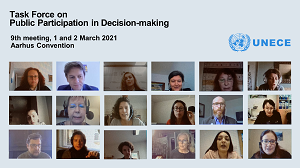To reduce transmission of the novel coronavirus, Governments in the UNECE region introduced social distancing and other measures, which have often included restrictions on the freedoms of assembly and of movement. Consequently, there has been an impact on procedural rights of public participation in decision-making, including in environmental matters. For instance, public hearings have been cancelled, postponed or moved online. Public hearings or inquiries offer an opportunity to respond to questions and provide a venue for dialogue among stakeholders. The move to virtual platforms and the use of information and communications technologies clearly expands the space for civic engagement and has a role in promoting responsible and accountable governance. However, the use of such technologies should be handled with due care, taking into account the needs of the public. Not all members of the public may be able to access such tools, in particular older persons, persons with low literacy skills, economically disadvantaged persons, etc.
Against this backdrop, the Task Force on Public Participation in Decision-making under the Aarhus Convention at its ninth meeting (Geneva, 1 and 2 March 2021) discussed two systemic issues of effective public participation: (a) participation of vulnerable and marginalized groups in decision-making; and (b) practices that facilitate more effective public participation without entailing additional significant resources on the part of public authorities. A thematic focus of this Task Force meeting was on public participation in decision-making in the extractive industries sector, on energy and climate and regarding emerging technologies. The Task Force, led by Italy, gathered online representatives of States, international and non-governmental organizations, Aarhus Centres, international finance institutions, academia and other stakeholders.
With a view to leaving no one behind, the Task Force noted that the current pandemic has made it more difficult for public authorities to reach out to and meaningfully engage marginalized and vulnerable groups. The pandemic has exacerbated existing inequalities and disparities and widened the digital, urban-rural and gender divide. To bridge this divide and to ensure effective public participation, public authorities should consider using new engagement techniques through electronic information tools complementary to and combined with traditional methods of communication. Challenges related to access to online technology and tools (for example, in rural areas) and aspects such as language, literacy and disability should be seriously considered in public participation processes. The Task Force encouraged Parties to assess procedures and tools to facilitate public participation and to make them accessible to vulnerable and marginalized groups, including children, older persons, women, migrants, displaced persons and refugees, persons with disabilities, indigenous peoples, persons with low literacy skills or facing language barriers, ethnic or religious minorities and economically disadvantaged groups and persons. The Task Force concluded that efforts should be made to identify and remove barriers that prevent the meaningful participation of vulnerable and marginalized groups. For these efforts to be successful, it was noted that this can often only be achieved by Governments engaging in a coordinated long-term approach.
With regard to an agenda item on effective public participation without significant resources, key messages deriving from the discussion included the need to: (a) encourage Parties to use electronic information tools for engaging the public in decision-making while ensuring at the same time that the needs of different target groups are met; (b) establish an appropriate legislative framework for public participation that supports both the efficiency and effectiveness of decision-making processes; and (c) strengthen interinstitutional cooperation for delivering one coordinated output, thereby saving time and resources.
Concerning the issue of emerging technologies, the Task Force noted that this topic is somewhat unknown to the general public, as are the impacts of emerging technologies. Awareness-raising is therefore required to facilitate the public’s involvement in decision-making. Science also has an important role in this regard to provide reliable science-based information. Moreover, the precautionary principle should be applied when considering decision-making on such technologies, while at the same time taking into account the need to allow for scientific progress.
When exchanging experiences, good practices and challenges regarding public participation in decision-making in matters related to the extractive industries sector, energy and climate, it was noted that: (a) public participation at the stage of development and approval of policies is critical; (b) considering the complexity of the subjects, public participation in decision-making will require extensive multifaceted consultations, both with the general public and experts; and (c) equal and meaningful opportunities for different social groups and stakeholders (for example, local inhabitants, non-governmental organizations (NGOs) and academia) to participate should be provided. Particularly important in this regard is the involvement of the younger generation in decision-making on climate and energy policies, as they will be the most affected.
Representatives of Albania, Kazakhstan, Latvia, Norway, Ukraine, the Finnish Network for Sustainable Mining, the European Bank for Reconstruction and Development and of NGOs shared experiences, good practices and challenges on these matters.
The Task Force encouraged Parties and stakeholders to widely promote the statement by the Compliance Committee regarding the application of the Aarhus Convention during the coronavirus disease (COVID-19) pandemic and the economic recovery phase and advice to Kazakhstan from the Compliance Committee on the holding of public hearings during the COVID-19 pandemic as useful guidance for promoting public participation during the pandemic and in similar challenging circumstances.
The outcomes of the meeting are expected to strengthen the capacity of governmental officials, NGOs and other stakeholders to promote effective public participation in environmental matters. Moreover, they can support countries’ efforts in the implementation of the environmental dimension of the Sustainable Development Goals, in particular Sustainable Development Goal 16 and its target 16.7 (responsive, inclusive, participatory and representative decision-making at all levels) that undergo in-depth review in 2021.
Meeting web page:
Aarhus Convention: https://unece.org/environment-policy/public-participation


